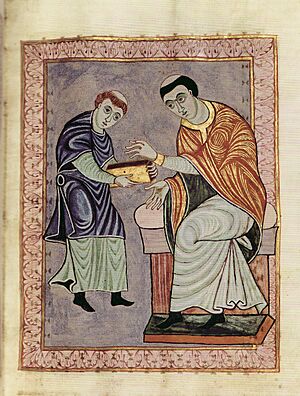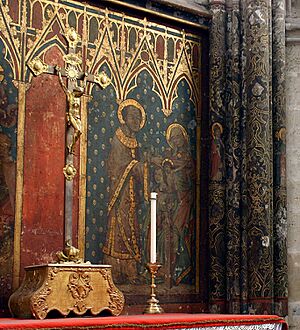Gero (archbishop of Cologne) facts for kids
Gero (born around 900, died June 29, 976) was an important religious leader in Germany. He served as the Archbishop of Cologne from 969 until his death. An Archbishop is a very high-ranking bishop who oversees a large area of churches.
Gero came from Saxony, a region in what is now Germany. His father was a count named Christian, and his brother was Thietmar, who was also an important leader.
Contents
Becoming Archbishop
In 969, Gero was chosen by the church leaders in Cologne to become their Archbishop. At first, the powerful Emperor Otto the Great was not happy with this choice. However, Gero soon proved his worth.
A Royal Ambassador
In late 971, Gero was sent on an important mission to the Byzantine Empire in Constantinople (modern-day Istanbul). His job was to arrange the marriage of Emperor Otto's son, Otto II, to the Byzantine princess Theophanu. This marriage happened in April 972 in Rome.
During this trip, Gero also brought back some special items called relics of Saint Pantaleon. These relics were for the dedication of the new St. Pantaleon's Church in Cologne. In 972, Gero attended a church meeting called a synod in Ingelheim. The next year, he was present at the funeral of Emperor Otto the Great.
Founding Monasteries
Gero was also involved in setting up new religious communities.
- In 970, he and his brother Thietmar used some of their family's land to start a monastery at Thankmarsfelde.
- By 975, this monastery became a royal monastery and was moved to Nienburg. It was used as a base to spread Christianity to the Polabian Slavs, a group of people living nearby.
- In 974, Gero also founded the monastery of Gladbach. This was built on the site of an older church that had been destroyed during attacks by the Hungarians.
Legacy and Art
Gero died in 976 and was buried in the Cologne Cathedral. He left behind a famous piece of art called the Gero Cross. This large crucifix is one of the oldest and most important in Germany. It was a big step forward in Western Christian iconography, which is the study of religious images and symbols.
The Gero Codex
The Gero Codex is another important item linked to Archbishop Gero. It was likely created around 969 at the Reichenau Abbey, a famous place for making books. This book contains an evangeliary, which is a collection of Bible readings for church services throughout the year.
The Gero Codex is a fantastic example of Ottonian art, a style of art from the time of the Ottonian emperors. Today, it is kept at the Darmstadt University of Technology and is recognized by UNESCO's Memory of the World Programme. This program lists important documents and archives from around the world.
Images for kids
 | John T. Biggers |
 | Thomas Blackshear |
 | Mark Bradford |
 | Beverly Buchanan |




